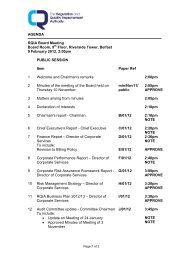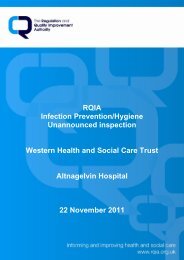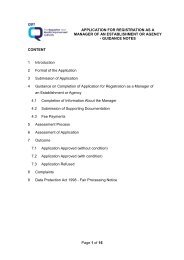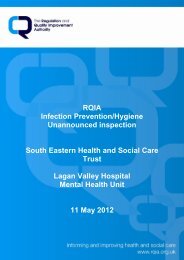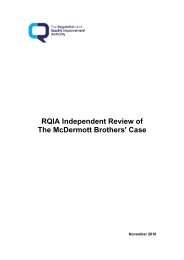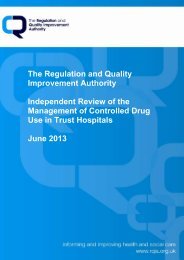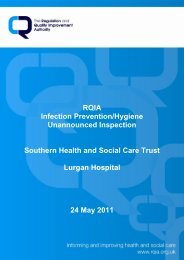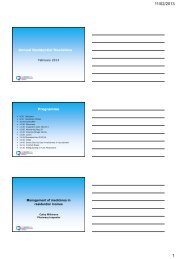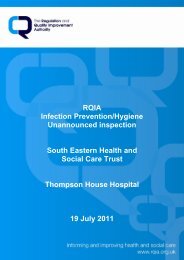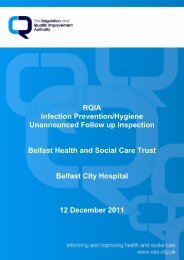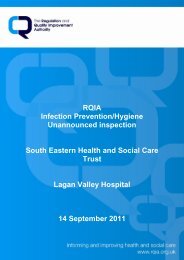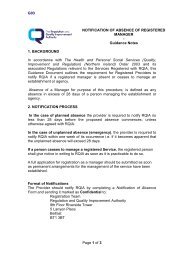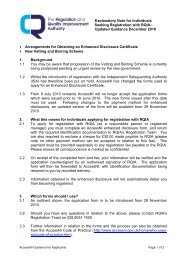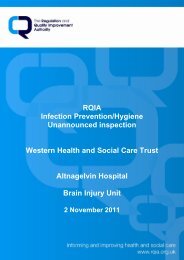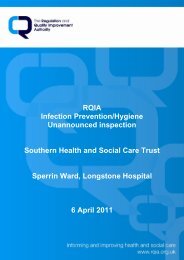Review of the Implementation of the Northern Ireland Single ...
Review of the Implementation of the Northern Ireland Single ...
Review of the Implementation of the Northern Ireland Single ...
You also want an ePaper? Increase the reach of your titles
YUMPU automatically turns print PDFs into web optimized ePapers that Google loves.
followed up by <strong>the</strong> trusts at a later date. As information about <strong>the</strong> carer is <strong>of</strong>ten<br />
contained in <strong>the</strong> cared for person‟s file, it is difficult to extract clearly information on<br />
<strong>the</strong> carer‟s needs, which is required by trusts and <strong>the</strong> Health and Social Care Board<br />
(HSC Board) for <strong>the</strong> purposes <strong>of</strong> planning and commissioning <strong>of</strong> services. At<br />
present this information is compiled manually by trusts.<br />
The review team was concerned about <strong>the</strong> structure <strong>of</strong> files as information about <strong>the</strong><br />
cared for person and carer is <strong>of</strong>ten contained in <strong>the</strong> same file which can be accessed<br />
by a range <strong>of</strong> pr<strong>of</strong>essionals. This could lead to difficulties in adhering to data<br />
protection requirements regarding confidentiality.<br />
Although all trusts have partnership arrangements in place with voluntary<br />
organisations to support carers, it was unclear if <strong>the</strong> effectiveness <strong>of</strong> <strong>the</strong>se contracts<br />
is being robustly evaluated, ei<strong>the</strong>r for best value or reviewed in terms <strong>of</strong> outcomes<br />
for carers.<br />
RQIA audited 401 anonymised carers‟ support and needs assessment forms and<br />
whilst completed assessments generally were <strong>of</strong> a good standard, <strong>the</strong>y could have<br />
been more focused in terms <strong>of</strong> <strong>the</strong>ir emphasis on <strong>the</strong> assessment <strong>of</strong> a carer‟s health<br />
and wellbeing.<br />
The review team noted that carers‟ assessments were mainly carried out by social<br />
workers. This practice has developed over <strong>the</strong> years but should be reviewed by<br />
trusts and <strong>the</strong> HSC Board and training provided to o<strong>the</strong>r pr<strong>of</strong>essionals to encourage<br />
<strong>the</strong>m to undertake carers‟ assessments, where appropriate.<br />
Most <strong>of</strong> <strong>the</strong> carers interviewed did not have access to <strong>the</strong> internet and did not use it<br />
to access information. This emphasises <strong>the</strong> need to provide information for carers<br />
from a range <strong>of</strong> sources. For those carers who did complete assessments, <strong>the</strong>y<br />
indicated that <strong>the</strong>y found <strong>the</strong> forms complicated and required pr<strong>of</strong>essional support to<br />
help <strong>the</strong>m complete <strong>the</strong>se. This requires to be reviewed by trusts in terms <strong>of</strong> <strong>the</strong><br />
simplicity <strong>of</strong> language used and <strong>the</strong> length <strong>of</strong> time taken to complete <strong>the</strong>se forms. It<br />
is important that trusts should also continue to seek carers‟ views on documentation<br />
used, in order to ensure a better uptake <strong>of</strong> assessments and service user feedback<br />
to <strong>the</strong> HSC Board.<br />
There is no working definition <strong>of</strong> unmet need and <strong>the</strong> manual collection <strong>of</strong> unmet<br />
need data continues to present a difficulty for trusts. The review team noted that this<br />
has been ongoing since 2007 and has been subject to previous recommendation by<br />
<strong>the</strong> DHSSPS.<br />
NISAT, a single assessment tool, was developed as a standardised assessment<br />
tool for older people and is comprised <strong>of</strong> three key components: Contact<br />
Screening; Core; and Complex assessments, supported by several additional<br />
components. It was envisaged that <strong>the</strong> introduction <strong>of</strong> <strong>the</strong> single assessment<br />
process, using NISAT tools as <strong>the</strong> foundation for implementation, would result in a<br />
major change in practice and culture within Health and Social Care with regard to<br />
assessing <strong>the</strong> needs <strong>of</strong> carers. The review team found that NISAT is not fully<br />
implemented in <strong>the</strong> Older People‟s Programme <strong>of</strong> Care across four trusts. The<br />
review team is <strong>of</strong> <strong>the</strong> opinion that until NISAT is fully implemented it will be difficult<br />
2



